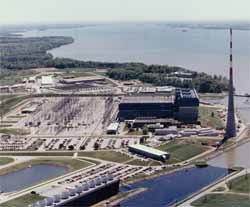 The U.S. Nuclear Regulatory Commission (NRC) has given the Tennessee Valley Authority (TVA) its worst rating in the entire country. The rating goes to the Browns Ferry Nuclear Plant, which is located in Alabama. This is the ninth time in only three years that the NRC has cited TVA for the violation of safety standards at one of its reactors.
The U.S. Nuclear Regulatory Commission (NRC) has given the Tennessee Valley Authority (TVA) its worst rating in the entire country. The rating goes to the Browns Ferry Nuclear Plant, which is located in Alabama. This is the ninth time in only three years that the NRC has cited TVA for the violation of safety standards at one of its reactors.
The NRC is proposing a citation for an incident that occurred on Dec. 22, 2012 in which the reactor at the plant tripped. A meeting in Atlanta, Ga., is planned to review the December shutdown, which an investigation blames on operator error. The reactor tripped while power was being restored on the Unit 2 reactor, according to media reports.
NRC spokesman Joey Ledford explained the unit was safely shut down, and no workers or residents of the local area were threatened during the incident. He said the NRC determined the finding is “white,” which means there was a low to moderate safety significance.
The Browns Ferry Plant has been of concern to people within the region surrounding the plant for years. There have been numerous protests from people who believe the plant’s operation is unsafe.
Located on the Tennessee River, the plant is located near Decatur and Athens, Ala., on the north side, or the right bank, of Wheeler Lake. It is named after a ferry that operated on the site until the mid-1900s.
The Browns Ferry Nuclear Plant was TVA’s first nuclear power plant, approved on June 17, 1966 with construction starting in September of that same year. At the time of the plant’s initial operation in 1974, it was the largest nuclear power plant in the world and was the first to generate more than 1 gigawatt of power.
In 2006, the NRC renewed the licenses for all three of the plant’s reactors for a 20-year extension.
On April 27, 2011, all three of the plant’s reactors scrammed because of external power was lost because of a tornado in the plant’s vicinity. Control rod insertion and cooling procedures did operate as designed, resulting in no physical damage to the plant and no release of radiation. Diesel backup generators powered the plant after a brief power outage. An NRC Unusual Event, which was the lowest level of an emergency classification, was declared because the plant lost power for more than 15 minutes.
Because of widespread transmission grid damage caused by the tornado and severe storms, significant blackouts occurred throughout the Southeastern U.S. Browns Ferry provides power to customers in a seven state region.
Rebecca Freeman worked for a local news paper and news reporter for US Finance Post.
